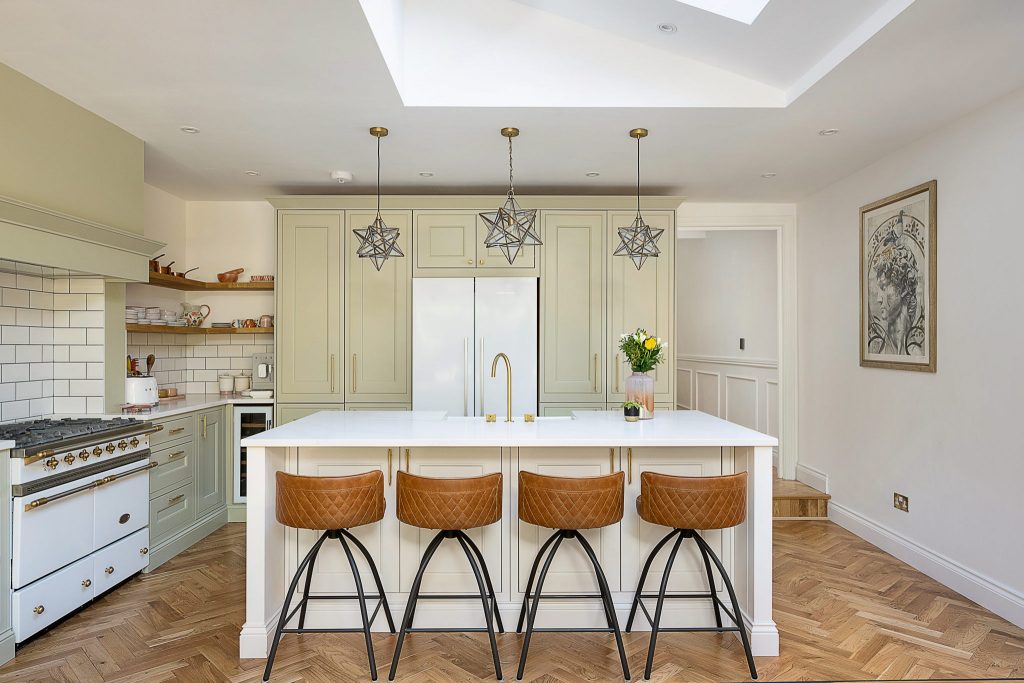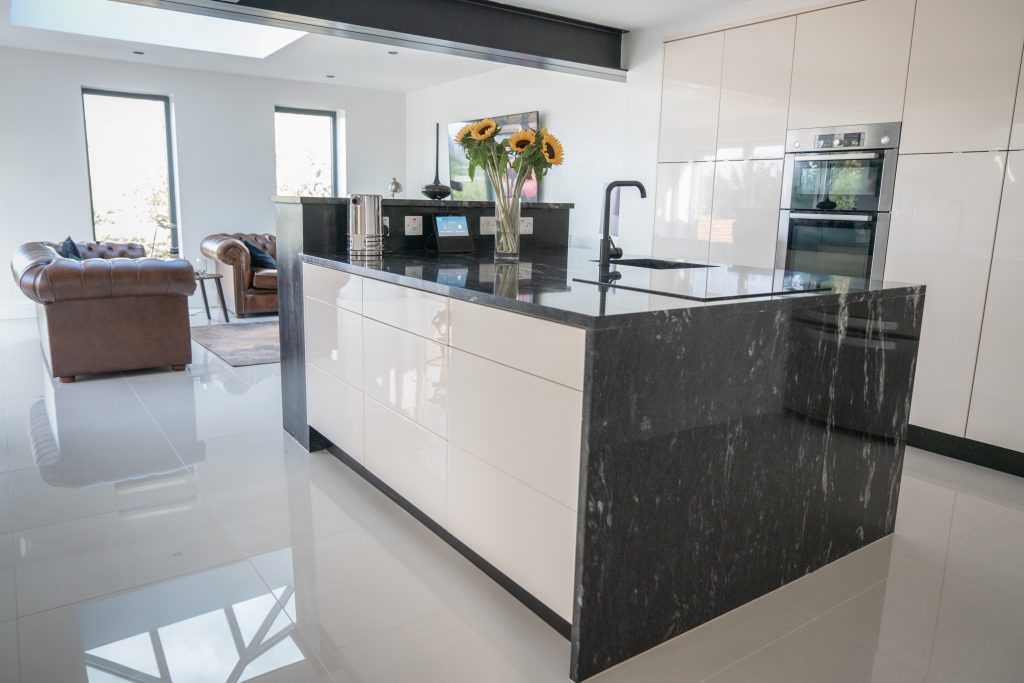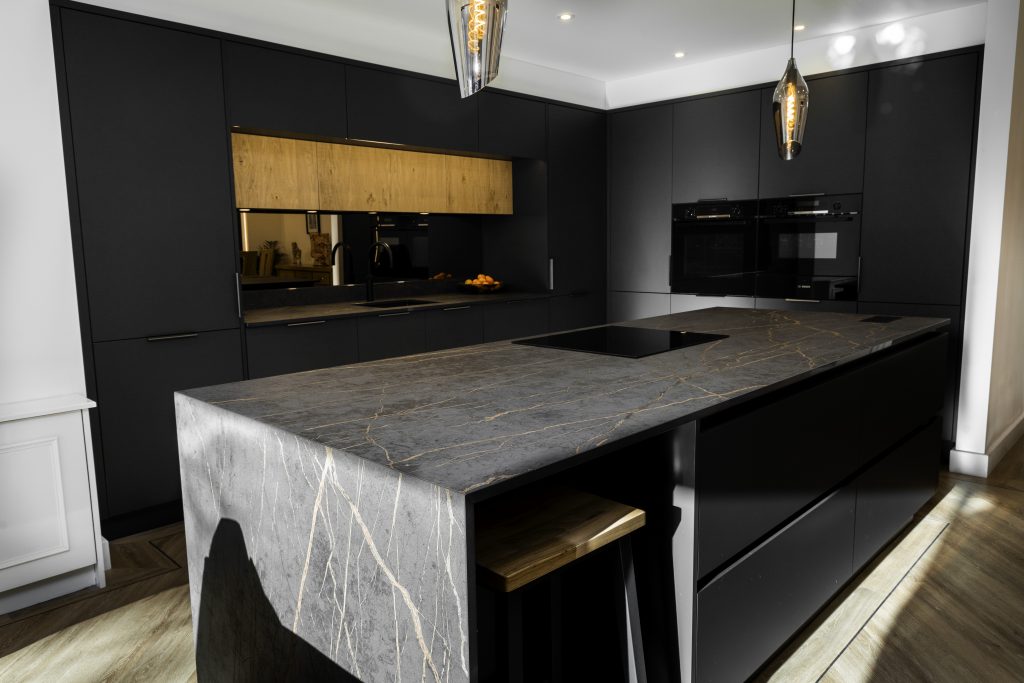Quartz vs. Granite vs. Porcelain Worktops: Which is Best for Your Kitchen?
Choosing the right worktop for your kitchen or bathroom is one of the most important decisions in any home renovation. Three of the most popular choices today are quartz, granite, and porcelain. Each material comes with its own set of advantages and disadvantages, from aesthetics to durability, maintenance, and cost. Here is an in-depth comparison to help you make an informed decision when choosing the perfect worktop material for your design.
Quartz Worktops
Quartz countertops are engineered surfaces made by blending 90-95% natural quartz crystals with 5-10% resin and pigments. This process results in a durable and uniform surface, making quartz a popular choice for modern kitchens and bathrooms.
One of the key benefits of quartz is its durability. It is a hard material, making it highly resistant to scratches, chips, and cracks, which is ideal for busy kitchens. Another advantage is that quartz is non-porous, meaning it does not absorb liquids and resists stains from substances like wine, coffee, or oils. This feature also makes quartz easy to maintain—since it does not need sealing, routine cleaning with soap and water is enough to keep it looking great. Additionally, because quartz is engineered, its design is more consistent compared to natural stone, offering uniform patterns and colours that suit modern interiors. Another major advantage is its hygienic surface, as the non-porous nature makes it harder for bacteria to penetrate.
However, quartz does have some drawbacks, although heat resistant it is not heat proof, so it’s not advised to place hot pots or pans directly on the surface but on a trivet or heat protection mat. Some people also feel that the artificial look of quartz, despite its stone-like appearance, lacks the natural character that materials like granite or porcelain offer. But with the development in quartz technology over the years this has meant it looks more natural. Finally, quartz can be expensive, particularly for premium designs or styles that replicate luxurious natural stones.

Look at our full range of quartz products
Our Quartz Worktops Range: Mayfair Granite Worktop Specialists in the UK (mayfairworktops.co.uk)
Granite Worktops
Granite is a natural stone, mined from the earth and cut into slabs. Each slab of granite is unique, with distinctive veins and patterns that make it a classic choice for homeowners who appreciate natural beauty.
The primary appeal of granite is its stunning natural aesthetic. No two slabs are alike, which adds an organic, one-of-a-kind touch to your space. Granite is also highly heat resistant, so you can place hot cookware directly on its surface for a short period of time without worrying about damage. In terms of durability, granite is hard and resistant to scratches, making it a long-lasting material that can endure years of use. Additionally, granite worktops often add value to your home, as they are seen as a premium feature.
However, granite has some limitations. As a porous material, it needs to be sealed periodically to prevent stains and ensure it remains stain resistant against the growth of bacteria. Another downside is the inconsistency in appearance—while its unique patterns are a draw for many, this can make it challenging to match granite slabs if you need to replace or extend sections in the future. Maintenance can be another concern, as improperly sealed granite is prone to absorbing liquids and becoming stained. Like quartz, granite is also costly, with rarer colours or patterns commanding even higher prices.

Porcelain Worktops
Porcelain also knows as Ceramic worktops is a newer option for worktops, made from natural clays and minerals that are fired at high temperatures to create an exceptionally durable surface. These worktops are known for their modern look and slim profile.
One of the standout qualities of porcelain is its durability—it is resistant to scratching and can withstand the demands of a busy kitchen. Porcelain is also highly heat resistant, allowing you to place hot pans directly onto the surface without fear of damage. Like quartz, porcelain is non-porous, so it resists stains and does not require sealing. Additionally, porcelain is UV-resistant, making it an ideal choice for outdoor kitchens or spaces that receive sunlight. Another benefit is the wide variety of designs available; porcelain can mimic the appearance of large slabs of other materials like marble or concrete, offering a broad range of aesthetic options.
Despite its benefits, porcelain also has some downsides. Depending on its thickness can make it more prone to chipping, particularly along the edges. The material’s thin profile also limits the available edge profiles compared to thicker materials like granite or quartz. While porcelain is highly durable, the combination of expert installation and material cost can make it as expensive as quartz or granite.

Choosing between quartz, granite, and porcelain worktops depends on your specific needs regarding aesthetics, maintenance preferences, durability requirements, and budget. Quartz offers limited maintenance with a modern look; granite provides natural beauty but requires more upkeep, while porcelain combines heat resistance with versatility in design. By assessing these factors, you will be well-equipped to make an informed decision that best suits your lifestyle.
We have included a handy table below to help you make the right material choice for your kitchen design. Finally, our worktop experts are just a phone call away and are more than happy to help you find the right material.
| Feature | Quartz | Granite | Porcelain |
| Durability | High | High | Very High |
| Maintenance | Low | Moderate | Low |
| Heat Resistance | Moderate | High | High |
| Cost | High | High | High |
